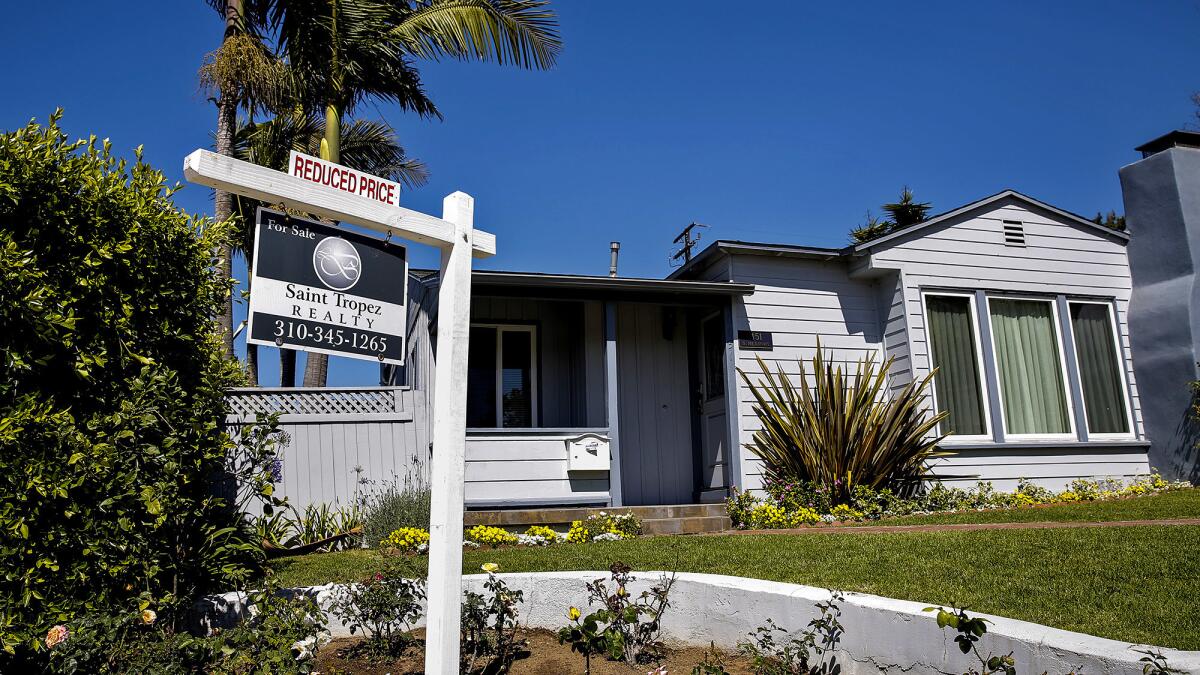Homeownership will get more expensive for some Californians under the GOP tax bill

- Share via
The Republican tax bill that appears headed for President Trump’s desk reduces the ability of home buyers to deduct mortgage interest, which will be a hit to home shoppers in Southern California and the Bay Area, where housing costs are sky-high.
But the interest provision is far more limited in scope than a previous proposal. Real estate experts and professionals said Tuesday that they don’t expect a big effect on home buying in the region, and that any ramifications will be largely restricted to well-to-do neighborhoods.
Under the new plan, which passed the House on Tuesday and was headed for a late vote in the Senate, buyers can deduct interest on mortgages up to $750,000, for homes bought after Dec. 15. (Homes purchased on that date or before then aren’t affected.) That’s down from the current $1-million limit, but an increase from a $500,000 cap that previously passed the House.
That means a home buyer with a 20% down payment can purchase a $930,000 home and still deduct all the interest. Even for a borrower who took out a $1-million loan at 4% interest, $30,024 of interest payments are deductible in the first year, leaving $9,656 that isn’t.
Christopher Thornberg, founding partner with Beacon Economics, predicted prices will keep on climbing in Southern California, given the robust economy and shortage of listings. “If you are borrowing a million bucks to get a home, the write-off is not your primary concern,” he said.
Some experts think the cumulative effect of other elements of the tax bill could crimp some markets.
Fadel Lawandy, a director at Chapman University’s Hoag Center for Real Estate and Finance, pointed out that the bill also caps property and state income tax deductions at a combined $10,000 — about $8,500 less than the average deduction taken by Californians in 2015, according to the Tax Policy Center.
Combined with the new cap on mortgage interest deductions, that could mean some households will have less to spend on housing, leading to price declines in some wealthy areas, Lawandy said.
“It will impact the high luxury-end market for sure,” he said.
Chris Lafakis, a director with Moody’s Analytics, said that by adding an estimated $1.5 trillion to the federal budget deficit over 10 years, the tax bill will put upward pressure on interest rates — including mortgage rates, which have remained under 5% for the last six years.
The tax bill doubles the standard deduction, which means fewer households will itemize. That may result in people buying a less expensive house because they couldn’t write off any interest, Lafakis figures.
A Moody’s analysis of a bill that previously passed the Senate — which eliminated the state income tax deduction but kept the $1-million mortgage deduction — estimated that home prices in L.A. County wouldn’t necessarily drop, but would wind up 3.8% lower than they otherwise would be by the third quarter of 2019.
“It is something that will hinder house price growth, but I wouldn’t say it’s going to do much more than that,” Lafakis said. “At the end of the day, we do have a strong economy in California.”
Among those watching the tax debate is Barry Sulpor, a real estate agent who specializes in the South Bay and has his office in Manhattan Beach, where the median home price was $2.26 million in October, according to Zillow.
Sulpor estimated that at least half of his clients take out mortgages over $750,000. He said some sellers are more willing to sell now, because they are uncertain how much longer prices can keep rising and how the tax bill will affect the economy.
Some economists, for example, expect the bill could have a slight drag on growth in high-tax California, even if they expect the economy to keep growing.
Sulpor said he doubts limiting the mortgage interest deduction would put the kibosh on people’s home search, but thinks some people may hesitate to sign a deal. “I think psychologically it could be a big deal, even though it may not practically matter that much,” he said.
The effect would have been greater if the House’s $500,000 mortgage interest cap had prevailed. According to real estate data firm CoreLogic, 22% of California mortgages taken out last year were for more than $500,000, versus 7.7% for more than $750,000.
So far this year in Los Angeles and Orange counties, 12.5% and 13.8% of mortgages taken out, respectively, were for more than $750,000.
Jeff Lazerson, president of Laguna Niguel mortgage brokerage Mortgage Grader, said he hasn’t heard much concern. “People who are bent on buying are bent on buying,” he said.
That includes Jake Schmidt, a client who is looking for a home in Orange County and expects to take out a mortgage for $1 million to $1.2 million.
The owner of an online retail business, Schmidt said he doesn’t know if he’ll pay more or less in taxes on next year’s income. But the uncertainty isn’t deterring his search for a five-bedroom house on a nice street for his children.
“It is not super critical, the pricing or the tax deduction,” said Schmidt, 39. “I am more interested in finding a good house for my family.”
Follow me @khouriandrew on Twitter
More to Read
Inside the business of entertainment
The Wide Shot brings you news, analysis and insights on everything from streaming wars to production — and what it all means for the future.
You may occasionally receive promotional content from the Los Angeles Times.











